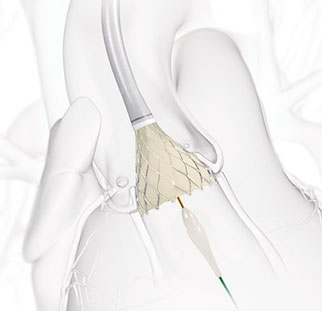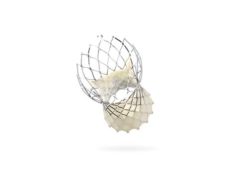
On 16 August, the US Food and Drug Administration (FDA) approved Edwards Lifesciences’ Sapien 3 and Sapien 3 Ultra and Medtronic’s Evolut R and Evolut PRO transcatheter aortic valve implantation (TAVI) systems for the management of low-risk patients. However, on 22 August, it issued a Class I recall for the Sapien 3 Ultra delivery system, citing concerns about burst balloons.
The expanded indication for CoreValve’s approval is based on randomised clinical data from the global, prospective, multicentre Evolut Low Risk Trial, which evaluated three valve generations (CoreValve, Evolut R, and Evolut PRO valves) in more than 1,400 patients. The approval for Sapien 3 and Sapien 3 Ultra is based on the PARTNER 3 trial. Both studies were presented earlier this year at the 2019 American College of Cardiology Scientific Session (16–19 March, New Orleans, USA).
Both companies have issued press releases reacting to the FDA’s approval announcement. Larry L Wood, corporate vice president transcatheter aortic valve replacement, at Edwards Lifesciences said: “This approval is a significant milestone and will allow all patients diagnosed with severe aortic stenosis to be considered for TAVI based on their individual preferences and anatomical considerations versus traditional risk scoring.”
The Sapien valve was first commercially approved in Europe in 2007. The FDA low-risk approval covers the Sapien 3 and Sapien 3 Ultra valves in all sizes. Martin B Leon (NewYork-Presbyterian/Columbia University Medical Center, New York, USA) was the national co-principal investigator of the PARTNER 3 Trial. In the press release from Edwards LifeSciences, he pointed out: “The PARTNER 3 Trial demonstrated that low-risk patients treated with the Sapien 3 TAVI experienced extraordinary outcomes, with 1% rates of death or disabling stroke at one year, a short length of stay, and 96% discharged to home or self-care. Sapien 3 is the only valve to achieve superiority over surgery based on the prespecified primary endpoint. Today’s FDA approval of Sapien 3 TAVI will expand access to this proven therapy, which should be considered the preferred treatment for the majority of low-risk severe aortic stenosis patients.”
Edwards Lifesciences also said that TAVI with the Sapien 3 system achieved superiority, with a 46% reduction in the event rate for the primary endpoint of the trial, which was a composite of all-cause mortality, all stroke, and rehospitalisation at one year.
The Class I recall for the Sapien 3 Ultra delivery system issued by the FDA is the most serious type of recall but does not mean that device has been taken off the market. The Sapien 3 Ultra delivery system is a part of the Sapien 3 transcatheter heart valve system, and is used to deliver and deploy the Sapien 3 Ultra transcatheter heart valve or the Sapien 3 transcatheter heart valve. The move follows a field safety notice issued by Edwards Lifesciences in July after receiving reports of burst balloons during implantation procedures. These resulted in significant difficulty retrieving the valve into the catheter and withdrawing the system from the patient, which could lead to vascular injury, bleeding, or surgical intervention. The FDA warned that use of the delivery system could cause serious adverse health consequences, including death. Edwards Lifesciences has provided recommendations for operators on how to avoid burst balloons, as well as instructions on how to respond if a burst balloon is suspected.
Responding to the approval of the CoreValve range, Michael Reardon (Houston Methodist DeBakey Heart & Vascular Center, USA), principal investigator and senior author of the Evolut Low Risk Trial, commented in the Medtronic press release: “The majority of my patients want a replacement valve that is going to minimise the risk of death, stroke, and other cardiovascular events during the procedure and allow them to leave the hospital faster and recover sooner. In patients appropriate for a biologic valve, that option is going to be TAVI. With the low-risk approval, risk stratification for TAVI treatment is becoming obsolete and heart teams will likely need to assess treatment options based on anatomical characteristics, concomitant risk factors, and also patient preference.”
Medtronic’s press release reports that data showed TAVI with the CoreValve range in the context of low-risk patients to have an excellent safety profile and to be an effective treatment option, with shorter hospitals stays and improved quality-of-life scores compared to surgery. In addition to a significantly lower rate of the composite of all-cause death or disabling stroke with TAVI at 30 days, the Evolut TAVI system demonstrated superior haemodynamic performance, with significantly lower mean aortic valve gradients and larger effective orifice area compared to surgery. However, the rate of new pacemaker implantation and residual aortic regurgitation was higher in the TAVI group.
Pieter Kappetein, vice president and chief medical officer for the Structural Heart and Cardiac Surgery businesses, which are part of the Cardiac and Vascular Group at Medtronic, stated: “This expanded indication means that physicians and patients will have more freedom to choose the right aortic valve replacement procedure based on each patient’s health and quality-of-life goals, which may vary based on their age, frailty and anticipated daily activity. This is an exciting time for patients and the clinical community alike as we now have an aortic valve replacement technology clinically demonstrated to be well-suited for the thousands of new patients who seek a less invasive treatment option that helps them get back to active living.”










